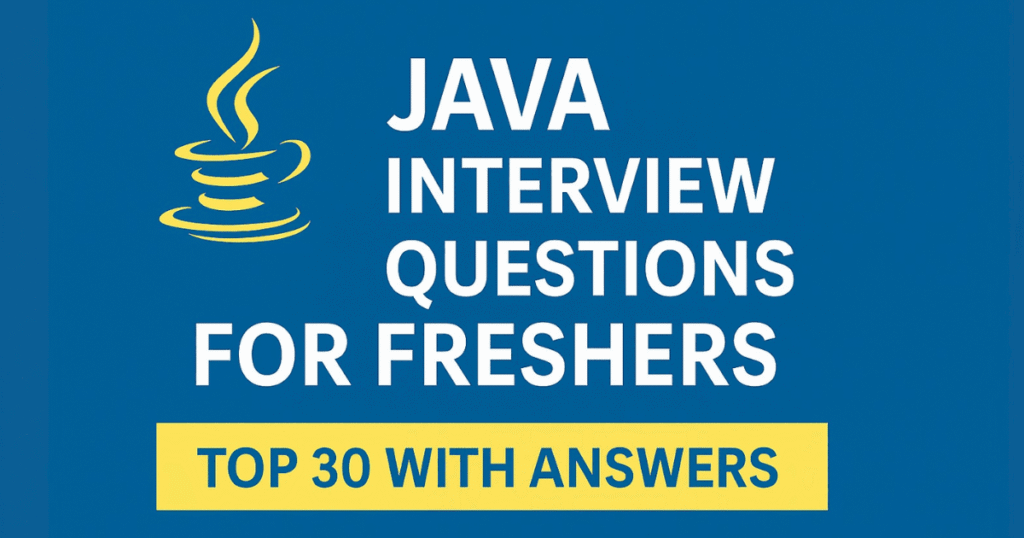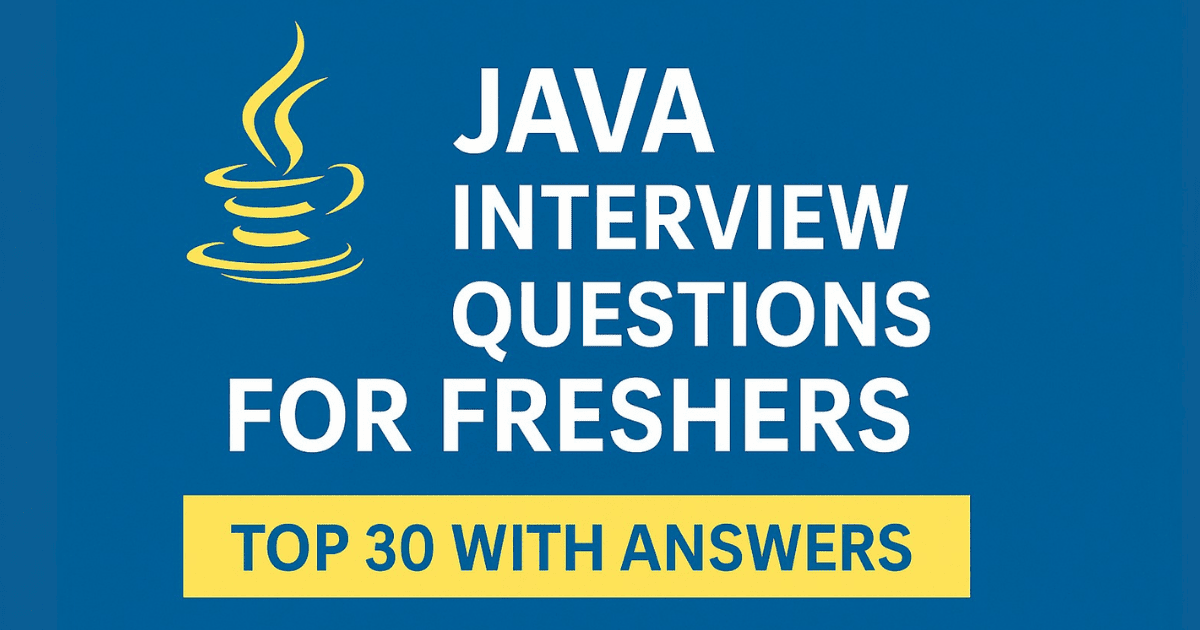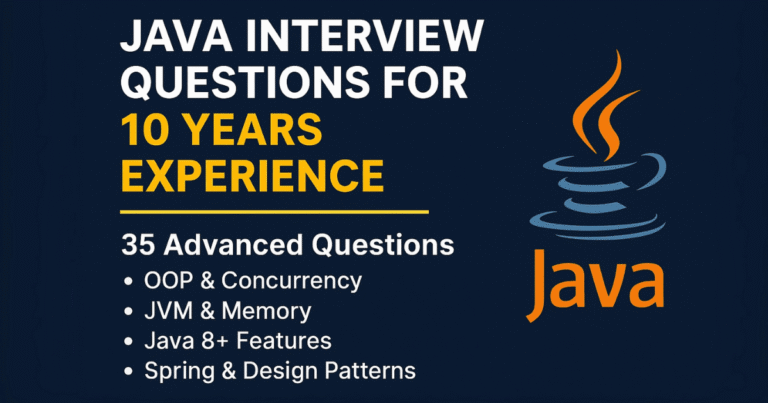30 Most Common Java Interview Questions for Freshers (With Answers)
If you’re a fresher preparing for Java interviews, this guide is for you. We’ve compiled the top 30 Java interview questions for freshers—covering everything from basic syntax to OOPs, exception handling, and more. This post covers the most common Java interview questions for freshers—with real-world examples, concise answers, and code snippets. Whether you’re preparing for an internship or a full-time job, mastering these questions can give you a strong edge.

📚 Java Interview Questions for Freshers (With Answers)
1. What is Java?
Java is a high-level, object-oriented, platform-independent programming language developed by Sun Microsystems in 1995.
2. What are the features of Java?
- Platform Independent
- Object-Oriented
- Simple and Secure
- Robust and Portable
- High Performance
- Multi-threaded
3. What is the difference between JDK, JRE, and JVM?
- JDK (Java Development Kit): Contains tools and JRE to develop Java applications
- JRE (Java Runtime Environment): Provides JVM and libraries to run Java programs
- JVM (Java Virtual Machine): Converts bytecode into machine code for execution
4. What is the main() method in Java?
It’s the entry point of a Java program.
public static void main(String[] args) {
System.out.println("Hello Java");
}
5. What is the difference between == and .equals()?
==checks memory address (reference comparison).equals()checks actual content (value comparison)
6. What is a Class and Object?
- Class is a blueprint or template.
- Object is an instance of a class created using the
newkeyword.
7. What is Inheritance?
Inheritance allows one class to inherit the fields and methods of another using the extends keyword.
8. What is Method Overloading and Overriding?
- Overloading: Same method name, different parameters (compile-time polymorphism)
- Overriding: Same method name and parameters in subclass (run-time polymorphism)
9. What is a Constructor?
A special method that is used to initialize objects. It has the same name as the class and no return type.
10. What is an Interface in Java?
An interface contains only abstract methods and constants. A class implements an interface to provide method definitions.
11. What are Access Modifiers in Java?
private: within the same classdefault: within the same packageprotected: package + subclassespublic: accessible from everywhere
12. What is the difference between Array and ArrayList?
| Feature | Array | ArrayList |
|---|---|---|
| Size | Fixed | Dynamic |
| Type | Primitives & Objects | Objects only |
| Flexibility | Low | High |
13. What is the use of the this keyword?
this refers to the current object of the class and helps differentiate between local and instance variables.
14. What is a static block?
It is used to initialize static variables. It runs once when the class is loaded.
static {
System.out.println("Static block executed");
}
15. What is abstraction?
Abstraction is hiding implementation details and showing only essential features using abstract classes or interfaces.
16. What is encapsulation?
Encapsulation is the process of wrapping data (variables) and code (methods) into a single unit (class) and restricting access via access modifiers.
17. What is polymorphism?
Polymorphism means one task can be performed in many ways.
- Compile-time: Method overloading
- Run-time: Method overriding
18. What are wrapper classes?
Wrapper classes convert primitives into objects:
int→Integerchar→Characterdouble→Double
19. What is type casting in Java?
Type casting converts one data type to another.
double d = 9.7;
int i = (int) d; // i = 9
20. What is the final keyword?
finalvariable: Constantfinalmethod: Cannot be overriddenfinalclass: Cannot be extended
21. What is the difference between break and continue?
break: exits the loopcontinue: skips the current iteration
22. Can a class have multiple constructors?
Yes. Constructor overloading allows a class to have multiple constructors with different parameter lists.
23. What is a package in Java?
A package is a namespace used to group related classes and interfaces.
package com.example.myapp;
24. What is exception handling?
Java provides try-catch blocks to handle runtime exceptions gracefully.
try {
int x = 5 / 0;
} catch (ArithmeticException e) {
System.out.println("Cannot divide by zero.");
}
25. What is the difference between checked and unchecked exceptions?
| Type | Example | Checked at Compile Time |
|---|---|---|
| Checked | IOException, SQLException | Yes |
| Unchecked | NullPointerException | No |
26. What is garbage collection in Java?
Garbage collection is the automatic process of identifying and removing unused objects from memory to free resources.
27. Can a constructor be private?
Yes. Private constructors are used in Singleton design patterns to restrict object creation.
28. What is the difference between throw and throws?
throwis used to explicitly throw an exceptionthrowsdeclares exceptions a method might throw
29. What is a marker interface?
An interface that has no methods. It’s used to provide metadata to classes, like Serializable.
30. Can we overload the main method?
Yes, but the JVM always looks for the standard:
public static void main(String[] args)
Other overloads won’t be executed by default.
✅ Final Thoughts
Cracking your first Java interview may feel overwhelming, but with this Java interview questions for freshers guide, you’re already ahead of the curve.
Keep learning, stay confident—and go ace that interview! 💼
✅ Want more guides like this?
📧 Subscribe to javainterviewquestionspro.com for weekly interview tips, cheat sheets & career growth advice.
✅ Practice Coding Daily
Use platforms like:
FAQ
Is Java still good for freshers in 2025?
Yes! Java remains one of the most demanded languages in enterprise software, Spring Boot microservices, and backend systems.Yes, Java remains in demand in 2025, especially for:
Backend Development
Spring Boot & Microservices
Enterprise Applications
Android App Development
Can I crack an interview with just Java?
Yes, but it’s best to also prepare:
Basic SQL
OOPs design
Collections
Logical reasoning (aptitude)
What are the most common Java interview questions for freshers?
The most common questions include:
What is Java?
What is the difference between JDK, JRE, and JVM?
What is the main() method?
Difference between == and .equals()?
Explain OOPs concepts in Java.
➡️ Check the full list of 30 Java interview questions for freshers above.
How should a fresher prepare for a Java interview?
Master Java fundamentals (OOPs, exceptions, collections), Practice coding daily (HackerRank, LeetCode), Understand real-world examples, Prepare 1-2 mini projects, Revise common interview patterns.
What topics are important in Java for interviews?
Important topics include:
OOPs principles
Inheritance, polymorphism, abstraction, encapsulation
Exception handling
Interfaces vs Abstract Classes
Arrays and ArrayList
Java Collections and basic multithreading
Java 8 basics (optional but useful)
Can I crack a Java interview as a fresher without a CS degree?
Yes! Many companies focus on problem-solving, logic, and Java fundamentals rather than your degree. A strong portfolio and project work help a lot.
What is the average salary for a Java fresher in India?
As of 2025:
Tier 1 companies: ₹5–8 LPA
Product startups: ₹7–12 LPA
Service companies: ₹3–5 LPA
Remote contracts (freelance): Even higher with experience



What’s up, its nice post about media print, we all know media is a
impressive source of data.